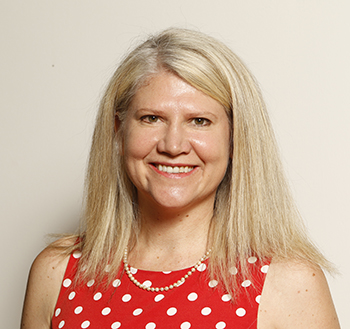
Dr Karen Lazenby, Registrar: Systems and Administration |
Dr Karen Lazenby, former Director: Client Service Centre at the University of Pretoria (UP), was appointed as Registrar: Systems and Administration at the University of the Free State (UFS) as from 1 November 2015. She will be responsible for student enrolment, administration and services, and International Affairs.
“We are extremely fortunate to have a person of the calibre and experience of Dr Lazenby to join the senior team to help us create a 21st century student-centred management system using the best technologies available. She is without question the leader in her field, and the UFS is delighted to have her as part of the Kovsie community,” says Prof Jonathan Jansen, Vice-Chancellor and Rector of the UFS.
Educational background
Dr Lazenby completed the BA (1992) and Honours (1993) degrees in English (cum laude) at the University of Potchefstroom before pursuing a Diploma in Tertiary Education (1996) and a Master's Degree in Computer Integrated Education (1998) at the University of Pretoria. She obtained a PhD in Education in 2003 on the topic ‘Technology and educational innovation: A case study of the virtual campus of the University of Pretoria’ and an Executive MBA from the University of Cape Town in 2006.
A track record to reckon with
Dr Lazenby started her career in higher education as a lecturer in Communication at the VaalTriangle Technikon in 1994, and was appointed as Head of Academic Staff Development the following year. A year later, she joined Technikon SA as instructional designer at the Centre for Courseware Design and Development, and in 1997 she was appointed as Manager of Institutional Research. She was subsequently seconded to establish TSA Online and coordinate institutional technology. Dr Lazenby was appointed as a project manager at the department of Education Innovation at the University of Pretoria in 1998 where she implemented WebCT/Blackboard, online applications and payments, and student and lecturer portals (virtual campus). In 2000 she was appointed as Deputy Director: Electronic Education.
She was seconded by the UP Executive to establish the Client Service Centre in 2001 to provide integrated, efficient and effective services to students and other clients of the University. During her time as Director: Client Service Centre, she was inter alia, responsible for information and data governance, the intranet, website and call centre of the university, student recruitment, publications, application for study support, study finance, postgraduate scholarships, student accounts, payments, residence placement, access cards and parking, the graduate career office, and international student division. In 2005, she also acted as Director: Corporate Communication and Marketing.
Her vision for the UFS
“I would like to get the university's student administration to such a point that academic staff can focus on teaching and research. Streamlining the enrolment process so that we may see the necessary yield required in terms of our growth target as a university, is my other goal.” She added that capitalising on the strong international positioning of the UFS achieved by Prof Jansen, is a mission she intends to carry out. "I am grateful for the opportunity to work with Prof Jansen and the senior management team and am delighted to be part of the Kovsie community."
Dr Lazenby has published several articles and presented nineteen papers at international conferences.